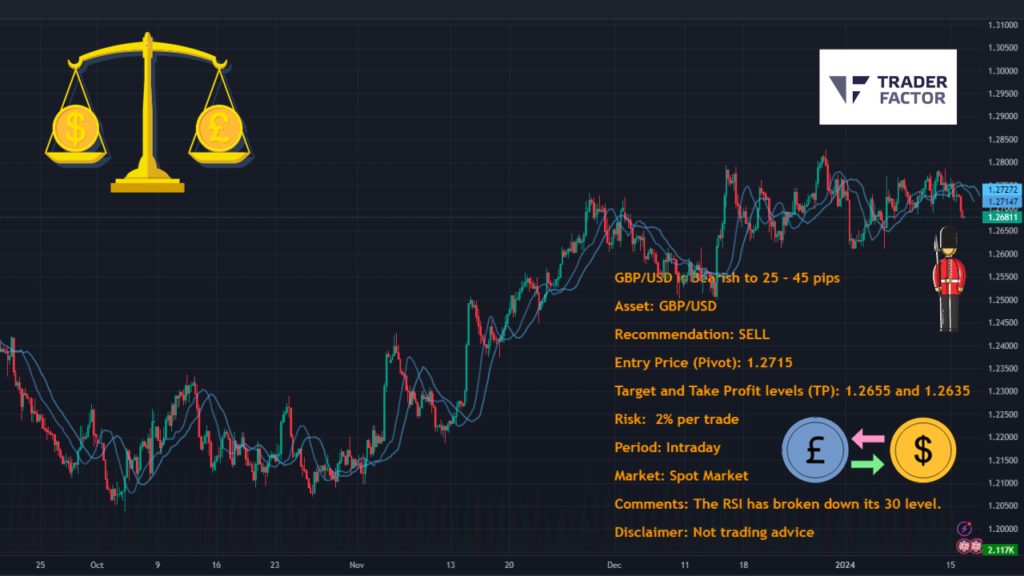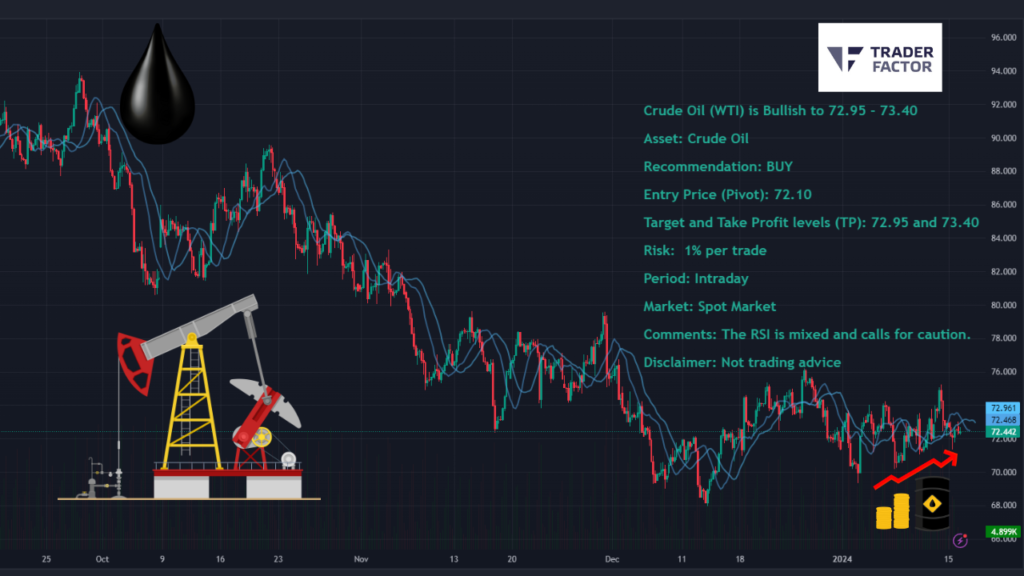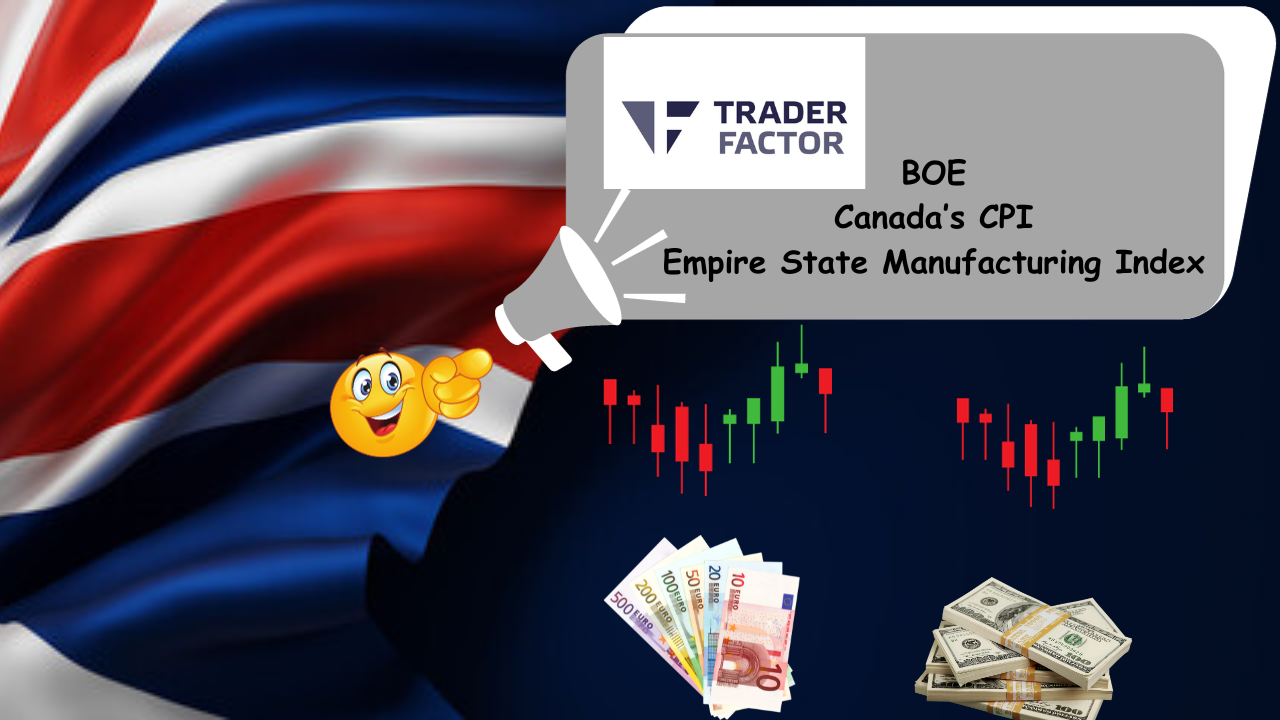The GBP/USD currency pair is currently grappling with substantial selling pressure, remaining around the 1.2650 mark. This trend follows the release of unclear UK employment data on Tuesday, leading to the British Pound’s further depreciation against the US Dollar.
The ongoing downward trajectory is primarily driven by a climate of risk aversion, potentially influenced by escalating geopolitical tensions in the Middle East.
GBPUSD Daily Chart

Furthermore, the latest data from the Office for National Statistics (ONS) reveals a slowdown in UK wage growth in November, while the unemployment rate remained stable. Despite this slowdown, wage growth is still at a level too high for the Bank of England to contemplate an immediate rate cut in the UK.
Analysing the Data
In the final quarter of 2023 (October to December), the estimated number of job vacancies in the UK fell by 49,000 to 934,000. Despite the drop, this figure remains above pre-COVID-19 levels.
For the period from September to November 2023, annual growth in regular earnings in Great Britain was 6.6%, with total earnings growth (including bonuses) at 6.5%.
Strengths and limitations
While these figures provide valuable insights into the UK’s labour market, they come with certain limitations. For instance, the December 2023 estimate of payrolled employees, which shows a decrease of 24,000 to 30.2 million, is provisional and will likely be revised upon receiving more data.
Table of Contents
ToggleLabour Disputes and Employment Trends
In November 2023, 69,000 working days were lost due to labour disputes across the UK, the lowest figure since May 2022. The majority of these disputes were in the transport, storage, information and communication industries.
Alternative estimates for the period from September to November 2023 reveal:
- An increase in the UK employment rate (for those aged 16 to 64 years) by 0.1 percentage points to 75.8%
- The UK unemployment rate (for those aged 16 years and over) remained largely unchanged at 4.2%
- A decrease in the UK economic inactivity rate (for those aged 16 to 64 years) by 0.1 percentage points to 20.8%.
| Time Period | Data Point | Value |
|---|---|---|
| Oct-Dec 2023 | Job Vacancies in the UK | Decreased by 49,000 to 934,000 |
| Sep-Nov 2023 | Annual Growth in Regular Earnings in Great Britain | 6.6% |
| Sep-Nov 2023 | Total Earnings Growth in Great Britain (including bonuses) | 6.5% |
| Dec 2023 | Payrolled Employees in the UK (estimated) | Decreased by 24,000 to 30.2 million |
| Nov 2023 | Working Days Lost Due to Labour Disputes in the UK | 69,000 |
| Sep-Nov 2023 | UK Employment Rate (age 16-64) | Increased by 0.1 percentage points to 75.8% |
| Sep-Nov 2023 | UK Unemployment Rate (age 16 and over) | Remained largely unchanged at 4.2% |
| Sep-Nov 2023 | UK Economic Inactivity Rate (age 16-64) | Decreased by 0.1 percentage points to 20.8% |
German Economic Data Drags EUR/USD Below 1.0900
Reflecting the impact of recent German economic data, the EUR/USD currency pair continues to experience a decline, now falling below the 1.0900 mark during Tuesday’s European trading session. Despite mixed responses to the German ZEW survey and hawkish sentiments from the ECB, the Euro remains unresponsive.
The ongoing tension in the Middle East during Tuesday’s Asian trading session resulted in riskier currencies taking a hit, while the demand for safe-haven assets rose. Amidst this, the EUR/USD pair dropped to a near-weekly low around 1.0900.
Despite the pushback from ECB policymaker Joachim Nagel against market expectations of early rate cuts, the Euro has not gained momentum. Nagel argued that discussions of rate cuts are premature given the high inflation rate.
ECB policymaker Robert Holzmann also resisted rate cuts throughout the year, citing potential increases in energy prices due to conflicts over Red Sea commercial shipments.
Furthermore, the German economy’s sluggish performance in 2023, burdened by inflation and global headwinds, is expected to keep the Euro under pressure. The German economy contracted by 0.3% in 2023 due to unfavorable financial conditions created by the ECB’s higher interest rates.
| Factors Affecting EUR/USD | Details |
|---|---|
| German Economic Data | Recent data release showing a contraction in the German economy is pushing EUR/USD down |
| ECB Policymaker’s View | Joachim Nagel and Robert Holzmann’s resistance to early rate cuts are failing to strengthen the Euro |
| German Economy | A contraction of 0.3% in 2023 due to higher ECB interest rates and inflation is keeping the Euro under pressure |
Previously, the forecast for the EUR/USD currency pair indicated a bullish trend, with expectations of the pair reaching between 1.1150 and 1.1270. T
Persistent Houthi Attacks and Global Economic Uncertainty Keep Oil Prices Steady
Despite continuous Houthi attacks on Red Sea vessels keeping the Middle East tensions at a high, oil prices remain stable due to a shaky worldwide economic outlook and an uptick in the US dollar. The global crude benchmark Brent managed to stay above $78 per barrel even after a slight 0.2% drop on Monday, while West Texas Intermediate traded under $73.
Crude Oil (WTI) Daily Chart

The situation was exacerbated when a US-owned commercial vessel was struck by a ballistic missile from the Iranian-backed Yemeni militants on Monday, reinforcing warnings about the high-risk nature of this crucial waterway. Further adding to the tension, Iran’s Islamic Revolutionary Guard Corps launched missiles at targets located in northern Iraq and Syria.
Yet, despite the surge in regional tension that supplies a third of the world’s crude, futures face downward pressure from broader financial markets. Officials from the European Central Bank have indicated that it might be premature to lower rates this year, given the persistence of inflation and geopolitical risks. The US dollar gained on Tuesday, making commodities costlier for international buyers.
Upcoming Economic Events and Their Potential Impact on Currency Markets
Today, several significant economic events are scheduled to take place, including Canada’s Consumer Price Index (CPI) month-on-month, the Empire State Manufacturing Index in the US, and a speech by Britain’s Bank of England Governor Bailey. Each of these events can have a substantial impact on currency markets.
1. Canada’s CPI Month-on-Month:
The Consumer Price Index measures the average change in prices over time that consumers pay for a basket of goods and services, which is a significant indicator of inflation. If the CPI is higher than expected, it could indicate rising inflation, which might prompt the Bank of Canada (BoC) to raise interest rates. Higher interest rates usually strengthen the Canadian Dollar (CAD) as they attract foreign capital into the economy. Conversely, a lower than expected CPI may lead to a weakening of the CAD.
2. Empire State Manufacturing Index:
The Empire State Manufacturing Index provides a measure of the health of the manufacturing sector in New York State. A reading above zero indicates improving conditions, while a reading below zero signals worsening conditions. If the index comes in higher than expected, it could signal a strengthening US economy, which would typically bolster the US dollar (USD). Conversely, a lower than expected reading could put downward pressure on the USD.
3. Britain’s BOE Gov Bailey Speaks:
Speeches by central bank officials, like the Bank of England’s Governor Bailey, can have a significant impact on currency markets. Traders will be closely watching for any hints about future monetary policy, such as changes in interest rates or quantitative easing measures. If Governor Bailey hints at tightening monetary policy or expresses optimism about the UK economy, this could strengthen the British Pound (GBP). Conversely, if he expresses concerns about the economy or suggests looser monetary policy, the GBP could weaken.
Disclaimer:
All information has been prepared by TraderFactor or partners. The information does not contain a record of TraderFactor or partner’s prices or an offer of or solicitation for a transaction in any financial instrument. No representation or warranty is given as to the accuracy or completeness of this information. Any material provided does not have regard to the specific investment objective and financial situation of any person who may read it. Past performance is not a reliable indicator of future performance.

















